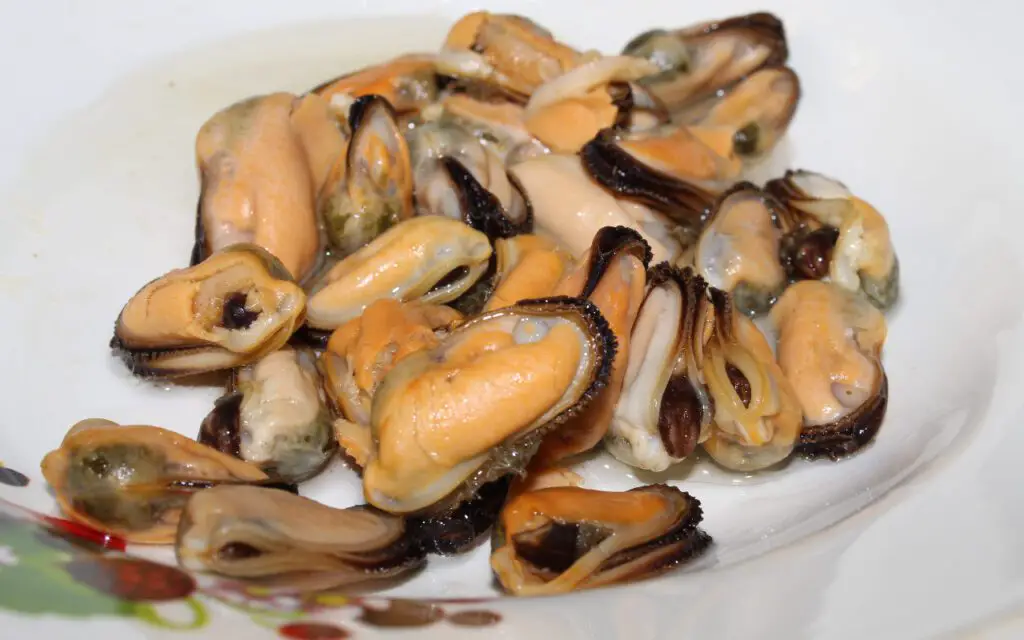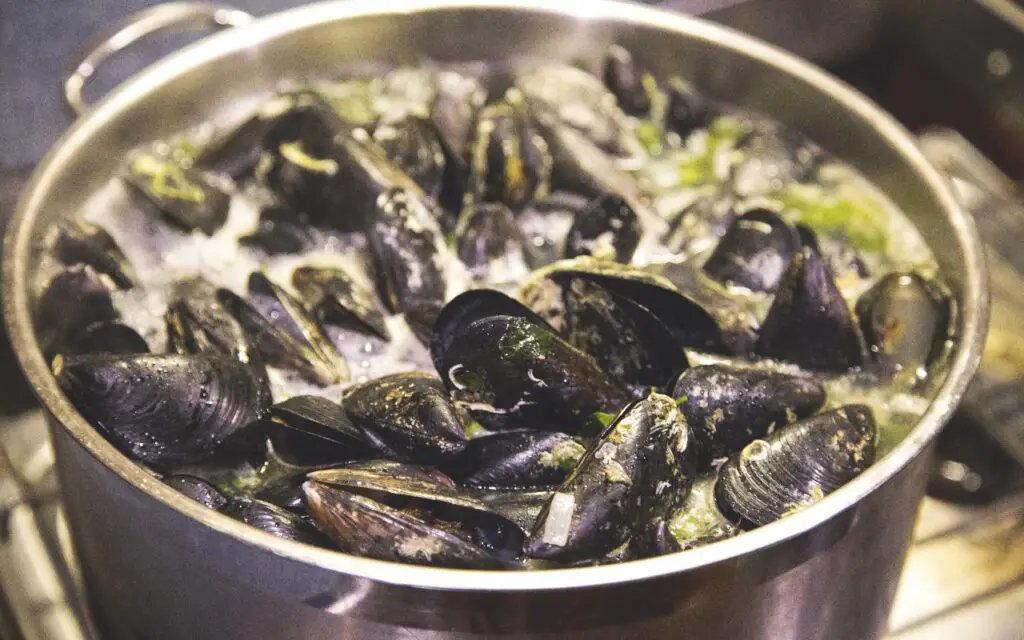If you’re a seafood lover, you may be wondering whether or not it’s safe to share your mussels with your furry friend.
While mussels can be a healthy and nutritious addition to your dog’s diet, it’s important to consider a few factors before offering them to your pet.
In this article, we’ll explore the benefits and potential risks of feeding mussels to dogs, as well as some tips on how to properly prepare and serve them.
By the end, you’ll have a better understanding of whether or not mussels are a good choice for your dog’s diet.
- Can Dogs Eat Mussels?
- How Many Mussels Can Dogs Eat?
- How Often Can Dogs Eat Mussels
- Health Benefits of Mussels To Dogs
- Potential Risks of Feeding Mussels To Dogs
- Nutritional Benefits of Mussels For Dogs
- Are Dogs Sensitive To Mussels?
- How To Prepare Mussels For Dogs
- How Fast Will Dogs Digest Mussels
- FAQs
- In Conclusion
Can Dogs Eat Mussels?

Yes, dogs can eat steamed, grilled, and baked mussels! Mussels are a great source of protein and omega-3 fatty acids, which are essential for canine heart and joint health.
They should always be cooked before feeding to your dog, as they spoil easily and can cause gastrointestinal issues if not properly prepared.
When introducing mussels to your dog’s diet, it is important to start with small amounts and monitor their reaction.
If you notice any adverse effects, stop feeding them immediately. Additionally, make sure the mussels you feed your pup are fresh and free from contaminants.
Overall, mussels can be a healthy addition to your pup’s diet when fed in moderation. They provide essential nutrients that help keep your pup healthy and happy!
See also: Top 10 Safe Seafood Options For Dogs To Eat
Can Dogs Eat Mussels
How Many Mussels Can Dogs Eat?

The amount of mussels that a dog can safely eat depends on their size and weight. As a general rule of thumb, dogs should not consume more than 10% of their daily caloric intake in treats, and you should take this into account when feeding them mussels.
If you’re feeding your dog mussels as a treat or as part of their meal, a good guideline is to give them no more than one to two ounces of mussels per 20 pounds of body weight, no more than twice a week.
This equates to about one to two whole mussels for a 20-pound dog.
It is important to remember that mussels should be served in moderation and as part of a well-balanced diet. Overfeeding mussels can cause digestive upset and lead to health issues over time.
As always, if you are unsure about how much to feed your dog, consult with your veterinarian. They can help you determine the appropriate amount of mussels based on your dog’s individual needs and dietary requirements.
Can Dogs Eat Mussels
Mussels Feeding Chart According To Size
| Food | Size | Portion |
|---|---|---|
| Mussels | Toy dogs | 1 ounce |
| Mussels | Small dogs | 2 ounces |
| Mussels | Medium dogs | 2 ounces per 20 pounds weight |
| Mussels | Large Dogs | 2 ounces per 20 pounds weight |
Mussels Feeding Chart According To Age
| Food | Age | Portion |
|---|---|---|
| Mussels | 0 – 6 months | Don’t feed |
| Mussels | 6 – 12 months | 2 ounces |
| Mussels | 12 – 24 months | 2 ounces per 20 pounds weight |
| Mussels | 24+ months | 2 ounces per 20 pounds weight |
How Often Can Dogs Eat Mussels
In general, mussels should not be fed to your dog more than twice a week, and should only make up a small part of their overall diet.
Feeding your dog too many mussels can lead to digestive upset and other health issues over time.
Additionally, mussels should always be cooked and properly prepared before feeding to your dog to avoid bacterial contamination.
Can Dogs Eat Mussels
Health Benefits of Mussels To Dogs
- Rich in Omega-3 Fatty Acids. Mussels are rich in omega-3 fatty acids, which are essential for maintaining joint health, supporting the immune system, and improving skin and coat health.
- Good Source of Protein. Mussels contain high-quality protein, which helps dogs build and repair muscle tissue.
- Contains Important Minerals. Mussels are a good source of minerals such as iron, magnesium, and zinc, which support overall health and well-being.
- Natural Anti-Inflammatory Properties. The omega-3 fatty acids in mussels have natural anti-inflammatory properties. This can be helpful for dogs with arthritis or other conditions that cause inflammation.
- High in Vitamin B12. Mussels are an excellent source of vitamin B12, which helps promote a healthy nervous system and is essential for red blood cell formation.
- Low in Fat. Mussels are naturally low in fat, which can be helpful for dogs that need to lose weight or maintain a healthy weight.
- Helps Prevent Anemia. Mussels are a good source of iron, which is important for preventing anemia in dogs. Anemia can cause fatigue, weakness, and other health problems.
Overall, adding mussels to your dog’s diet can be a great way to boost their health and provide them with important nutrients. However, it is important to remember to always consult with your veterinarian before making any changes to your dog’s diet.
Potential Risks of Feeding Mussels To Dogs
- Allergies. Some dogs may have allergies to shellfish, including mussels. If your dog experiences symptoms such as itching, hives, or vomiting after eating mussels, it may be allergic.
- Contamination. Mussels can sometimes be contaminated with harmful bacteria, viruses, or toxins. This can be especially risky for dogs with compromised immune systems, young puppies, or elderly dogs.
- Choking Hazard. Mussels have a hard exterior shell, which can be difficult for dogs to break open. There is a risk that your dog may choke on a shell or accidentally ingest it, causing a blockage in their digestive tract.
- Overconsumption of Salt. Some mussels are seasoned with salt, which can be harmful to dogs in large amounts. Too much salt can lead to dehydration, electrolyte imbalances, and other health problems.
- Parasites. Mussels can sometimes contain parasites, such as worms or protozoa, which can lead to gastrointestinal upset or other health issues.
It’s important to remember that while mussels can be a healthy addition to your dog’s diet, there are potential risks to consider. Always consult with your veterinarian before introducing any new foods to your dog’s diet, and be sure to properly prepare and store mussels before feeding them to your pet.
Nutritional Benefits of Mussels For Dogs
| Mussels Nutrition Facts per 100 grams | % DV * |
|---|---|
| Calories | 172 |
| Total Fat | 4.5 g |
| Cholesterol | 56 mg |
| Sugar | 0 g |
| Glycemic Index | 0 |
| Sodium | 369 mg |
| Carbs | 7 g |
| Protein | 24 g |
| Vitamin D | 22% |
| Calcium | 3% |
| Iron | 37% |
| Potassium | 268 mg |
Are Dogs Sensitive To Mussels?
Yes, dogs can be sensitive to mussels, and some dogs may even have an allergy to shellfish. Here are some symptoms of mussel sensitivity in dogs:
- Vomiting and/or diarrhea. Digestive upset is a common sign of sensitivity to mussels in dogs. It may occur shortly after eating mussels or within several hours.
- Itching or scratching. Some dogs may experience itching or scratching, which can be caused by an allergic reaction.
- Red, inflamed skin. Allergic reactions can cause the skin to become red, inflamed, and/or irritated.
- Swelling. Swelling of the face, throat, or other parts of the body may occur in severe cases of mussel sensitivity.
- Difficulty breathing. In rare cases, a severe allergic reaction may cause difficulty breathing or even anaphylactic shock.
If you suspect your dog may be sensitive to mussels or other shellfish, it’s important to stop feeding them immediately and consult with your veterinarian. They can help determine if your dog has a sensitivity or an allergy, and recommend appropriate treatment.
How To Prepare Mussels For Dogs
- Steamed Mussels. Steam the mussels for about 5 minutes until the shells open up. Once cool, remove the mussels from the shells and chop them into small pieces. Mix the chopped mussels into your dog’s regular food.
- Grilled Mussels. Preheat your gas grill to high heat or prepare a charcoal grill with high heat. Grill the mussels in the shells for about 2-3 minutes. Once cool, remove the mussels from the shells and chop them into small pieces. Mix the chopped mussels into your dog’s regular food.
- Baked Mussels. Preheat your oven to 400°F. Rinse the mussels and arrange them in a baking dish in a single layer. Bake for 10-12 minutes until the mussels are fully cooked and the shells have opened up. Once cool, remove the mussels from the shells, chop them into small pieces, and mix them into your dog’s regular food.
How Fast Will Dogs Digest Mussels
The digestion of mussels in dogs depends on various factors such as the size of the dog, age, and health status. In general, dogs have a faster digestive system compared to humans, and the digestion of mussels typically takes a few hours.
Once mussels are consumed, they are broken down by digestive enzymes, and their nutrients are absorbed into the bloodstream. The actual digestion process can take anywhere from two to five hours depending on your dog, with smaller dogs often digesting food more quickly than larger breeds.
It’s important to note that while mussels can provide important nutrients for dogs, they should always be cooked and properly prepared before feeding. Undercooked or raw mussels can contain harmful bacteria or toxins that can cause digestive upset and other health issues.
If you notice any signs of digestive upset or other symptoms after feeding your dog mussels, it’s important to contact your veterinarian to ensure that your dog is not experiencing any health issues related to their digestion.
FAQs
Can dogs eat mussels in vinegar?
Yes, dogs can eat mussels in vinegar. Mussels are a great source of protein and omega-3 fatty acids for your pup, so they’re an excellent snack.
However, it’s important to remember that mussels should be cooked thoroughly before serving them to your dog as there is a risk of food poisoning if not cooked properly.
In Conclusion
In conclusion, dogs can eat mussels as a healthy and nutritious addition to their diet. Mussels are a good source of protein, omega-3 fatty acids, and important minerals that support overall health and well-being.
However, it’s important to feed them in moderation and to ensure that they are properly cooked and free of contamination. Mussels should not be a staple of your dog’s diet, but rather an occasional treat.
Related articles:
- Can Dogs Eat Raw or Cooked Salmon?
- Can Dogs Eat Shrimp? Shell-Yeah!
- Can Dogs Eat Tuna? From The Sea To The Bowl
- Can Dogs Eat Cod? A Nutritious Treat For Your Pooch
- Can Dogs Eat Crab? Don’t Be Shellfish, Share Some With Your Pooch
- Can Dogs Eat Lobster? A Gourmet Treat For Your Pooch
- Can Dogs Eat Squid? Squid-tastic Addition To Your Dog’s Diet
- Can Dogs Eat Scallops? Paws Up or Paws Down?
- Can Dogs Eat Sardines? Tiny Fish, Big Impact





Leave a Reply